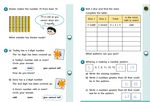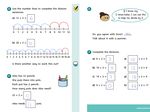Y2 - ANSWER PACK - Remote Learning - 2021 25th- 29th January
←
→
Page content transcription
If your browser does not render page correctly, please read the page content below
English Answers Lesson 1
Tick the sentence which correctly uses an Deepen the Moment
apostrophe to show possession. Rewrite each sentence below into a sentence that
contains an apostrophe to show possession. For
example:
1. ✓ Dad’s bike tyres had a puncture.
The teeth belonging to an orca are extremely sharp.
☐ Dads bike tyre’s had a puncture. The orca’s teeth are extremely sharp.
2. ☐ The orcas prey’ was a vulnerable seal. 1. The blubber belonging to a penguin is a thick layer
of fat.
✓ The orca’s prey was a vulnerable seal.
The penguin’s blubber is a thick layer of fat.
3. ✓ I often borrow my brother’s scooter.
2. The fur belonging to a fur seal traps air and helps
☐ I often borrow my brothers scooter’. them keep warm.
The fur seal’s fur traps air and helps them keep warm.
4. ☐ Miss Seniors’ favourite day of the week is Friday.
✓ Miss Senior’s favourite day of the week is Friday.
Year 2 Answer PackEnglish WAGOLL for Lessons 2-4 Introduction (written within Friday’s lesson) Have you heard about the extraordinary orcas that live in the Antarctic ocean? Orcas, also known as killer whales, are the largest predator of warm-blooded animals alive today. Would you like to find out more about these powerful, threatening predadtors? Read on to find out more… you won’t be disappointed! Habitat Orcas are found in all oceans. However, they are mainly found in colder waters such as Antarctica, Norway and Alaska. Orcas are able to survive in any ocean that is between 0 degrees celcius and tropical water temperature (around 24-27 degrees celcius). If an orca was placed on land, it would only survive for a couple of hours because the blubber it carries on its body would dry out extremely quickly. Did you know that an Orca’s circulatory system helps it maintain its body temperature? This is why it is able to adapt to its habitat, such as the freezing cold waters of Antarctica! Diet Orcas are fascinating mammals that are at the very top of the food chain. They have very diverse (different) diets, feasting on fish, penguins and sea lions. An orca’s powerful nature means that they are capable of killing vulnerable leopard seals and great white sharks. This diet is extremely different to a humans, although humans eat fish! As Orcas travel around in ‘pods’ of up to 40 orcas, this means that they are extremely threatening to any prey they want to hunt. Once their vulnerable prey is captured, Orcas will use their 4-inch, razor sharp teeth to bite and eat. Appearance Did you know that Orcas are actually classed as dolphins? Orcas are the largest of the dolphin family and have a bold appearance: a large black body, a white underside and a white patch above and behind their eye. Orcas grow up to the size of 32 feet… that’s the size of a single decker bus! Orcas also have a thick, fatty layer of blubber which helps them keep warm in the water where temperatures are a lot colder. Year 2 Answer Pack
Reading for productivity Answers
Music answers DT answers
PSHCE answers Science answers
Computing answers
Year 2 Answer PackYou can also read


























































